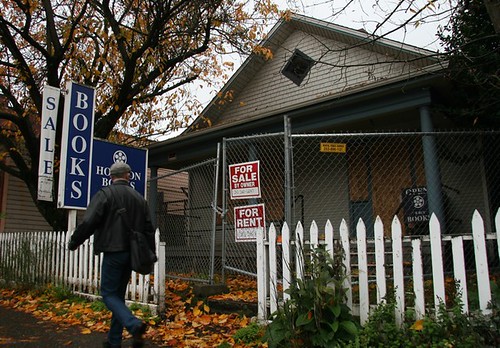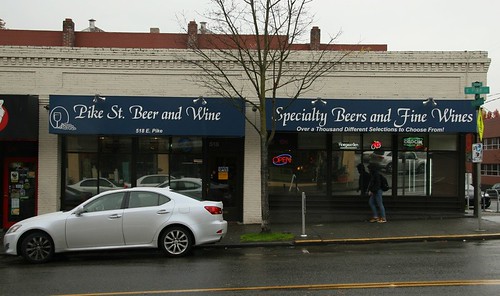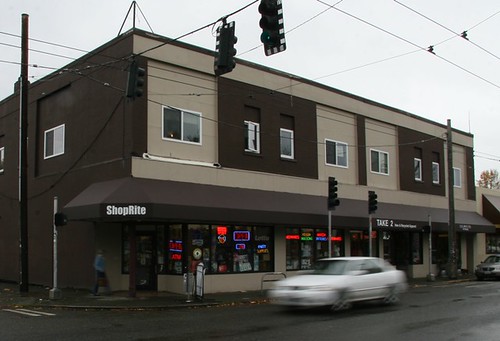
Well, that was quick. Walking through Bailey/Coy Books today, about ten days since the bombshell news came out that the store would close at the end of November, was much sadder than expected. While braced for something far removed from a usual bookstore visit I was surprised at the knot in my stomach at the sight of the store standing on its very last legs.
Roughly half the floor space has been cordoned off by bookshelves, leaving visible empty floor space behind. Shelves are stocked with a far smaller number of titles than you might presume and a fractional amount compared to what constituted business as usual. There’s been a mad rush to take advantage of bargains before the store closes for good. Another telling sign: The shelves themselves are for sale.
No surprise that there’s pretty much universal agreement that Bailey/Coy’s closure is a terrible thing. On Broadway for 26 years, the store has been (and still is, for the next three weeks at least) one of Capitol Hill’s signature businesses.
But sadly, perhaps not surprisingly, it’s hardly the first time a well-established independent bookstore on the Hill has closed its doors. For one example, in March of this year Horizon Books shut down on 15th Avenue East, not long after closing its University District location. In so doing, a used bookstore that had been around for more than 30 years ceased to be.
Remember also Beyond the Closet at 518 E. Pike Street. The LGBT bookstore closed in 2005; I believe it opened in the late ‘80s. Capitol Hill was obviously a natural fit for the store before vast changes to the bookselling industry led to its financial downturn. Another factor in this case was greater acceptance of LGBT titles in mass-market bookstores like Barnes and Noble. By the middle of this decade selling gay and lesbian titles was not the mark of distinction it once had been.
Going back a little further, Pistil Books held court on East Pike Street where Bimbo’s Bitchin’ Burritos now draws crowds. But in the Spring of 2001, owners Amy Candiotti and Sean Carlson closed the physical store and became an Internet-only operation. During a gathering at the store to discuss changes in the book industry, the owners bemoaned closing the shop but had to face economic realities. Carlson said he’d been making $5 per hour for years, an amount that simply wasn’t sustainable. The bright side in this case is that the online business remains; check them out at www.pistilbooks.net.
Those who’ve logged more than a decade of residence on the Hill may remember Red and Black Books on 15th Avenue East, where Shoprite currently plies its trade. The store featured a huge variety of publications simply not found in other stores. Leftist political treatises, obscure poetry, multicultural children’s books – the store’s mission was to sell non-mainstream titles. Logically located on the Hill and run as a collective of devoted members, its model worked for years. And then did not: the store closed in early 1999. Another bookstore, Pages, opened in the space briefly, focusing more on being an Internet café when such things were somewhat novel and closing shortly thereafter.
Just about everyone knows that what’s lost when independent bookstores close is more than places where one can buy books. Bailey/Coy Books helps define Broadway and Capitol Hill. No doubt the Elliot Bay Book Company, should it move to the Hill, could fill a void Bailey/Coy will leave behind. But this would come at the expense of the void its departure would create in Pioneer Square. While such a relocation would be good for the Hill, it’s probably not a great move for the city as a whole. Call it NIMBYism in reverse.
If Bailey/Coy couldn’t make it, nor the others that have gone under before it, who can? Because it’s hard to imagine a neighborhood where a niche bookstore like Red and Black or Beyond the Closet, or a well-titled independent like Bailey/Coy would fare better. And that is truly a scary thought.





don’t forget pilot books is still kicking it at 219 broadway e. upstairs. great indie bookstore!
When I moved to Seattle in 1982, Red and Black Books was upstairs in the building next to the Canterbury. The downstairs, where Samui Thai Cuisine now lives, was a collective ice-cream parlor/restaurant.
don’t forget about City Books – great selection of political books
Maybe the decline of the
independent bookstore is the beginning
of the end for printed books and materials in general. I am sad
to see them go but the ease of a Kindle is
hard to compete with and the introduction of
things like the upcoming Apple tablet will bring
color photographs, etc to the ebook world. Maybe this process is like
the decline of record shops in the late 90s. I know
people hate to hear this– my own mother wants to
throw me out of the house when I bring it up. Bookstores are a wonderful
thing but I think that there will be very few
of them in another 10 years.
Come on, I think you’re thinking more like 100 years from now. I can’t see the end of actual printed books anytime soon.
i think there will always be room for bookstores, the only difference is that they will need to learn to adapt to the new technology and embrace them.
instead of trying to compete with online book sales, bookstores should embrace it. the strength of online book sellers like amazon is their depth and technology infrastructure. their weakness is that they are only online.
that is the angle that local bookstores can exploit if they have the vision and tech savvy. Why not use amazon’s infrastructure to capitalize on online book sales and increase revenue (amazon specifically encourages this reseller model), but then also offer something that Amazon can’t: an in-store experience with knowledgeable and personable staff, and a healthy collection of books in stock to allow for traditional perusing or browsing.
Why not have computer terminals in the bookstore to allow people to casually drop in an order their book? Or let them download an e-book to their kindle in your store? Does Amazon have digital reselling programs? If not, maybe an enterprising bookstore could pilot that with them.
In short, bookstores will always exist, it’s just up to the next generation (of which I consider myself a part or) to re-imagine the traditional bookstore business model and come up with something that will continue to live in the future.
I don’t see the end of printed books any time soon, but it does seem like we’re seeing the end of the small independent neighborhood bookstore. A lot of them have closed recently, and when was the last time a new one opened? It seems like the successful independent bookstores now are the big destination stores, like Powells in Portland or Village Books in Bellingham.
Here is a list of retail bookstores that have come and gone on Capitol Hill since 1993 (when my bookstore, Pistil Books, opened):
Red & Black Books
Pages (in the same space as Red & Black)
Beyond the Closet (on Pike)
Dundee Books (this was around for only about a year on Pike St.)
Horizon Books (used books on 15th)
Fallout Records (they had comics and zines)
Automotive Books (specialty store on 12th Ave.)
Co-op Books (little leftist store on 18th Ave.)
Pathfinder Books (socialist bookstore on Madison)
Warehouse Books (in the Broadway Market)
Chameleon Books (on 15th)
Boticelli Books (where Spine & Crown is now)
Bailey/Coy
We still have these bookstores:
Spine & Crown
Twice Sold Tales
Half Price Books
Louis Collins Rare Books
Pilot Books
City Books
Edge of the Circle (not just a bookstore)
Quest Book Shop
Horizon (online)
Pistil Books (online)
I’m probably forgetting some…
Also Revolution Books which has moved from Capitol Hill to the International District.
First a shout out to the late, lamented Confounded Books (formerly sharing space with Wall of Sound Records.) Zines, indie comics, books, artsy and hipster fodder – no one has filled this niche- it was a place that made Seattle feel more cosmopolitan and so a double loss.
As for the end of book shops (shops dedicated to selling books – not corporate media stores selling a smattering of what’s currently in print alongside DVDs, CDs, blank journals, coffee, internet kiosks, tote bags, magazines, etc.), the check is in the mail. I run Spine and Crown, and I can tell you that independent book shops stay open through sheer will power, a very little money, and nothing else. If will or money falter, the shop is gone.
Yes, books will still be around in the future, as will booksellers. But don’t confuse the phenomenon of the book shop with the phenomenon of the book trade. The book trade, thanks to the internet, can now continue happily on without shops. I sell a lot online. In fact, I would make more money if I closed my shop. And it’s not the economy – my through-the-door trade has rarely ever exceeded my rent and often fell under it. So what keeps it going? Will power. The belief that a book shop has an important role to play in a community. But it won’t take many more bumps in the road for us to go the way of Pistil. I often think of them with envy. They travel, and I think I’ve seen Sean and Amy having fun once or twice. I work 6 days a week and can’t afford to get away. (Poor me! Could be unemployed, like everyone else!)
So. Bookselling will always exist (catering to an ever smaller, aging market), and book shops may always exist – but very few will in cities. Not unless rents come down (around the time pigs fly) or we find landlords more concerned with culture than profit (not unheard of, but rare as hen’s teeth.) Book shops will NEVER be able to pay Starbucks money for a retail space. Given the prospects, I see running a book shop primarily as a big middle finger aimed at all the trends in society worth opposing. But it’s mostly that: an impotent gesture.
And while I’m at it, what no one wants to acknowledge, but that booksellers seem to understand well is that few people actually seem to LIKE reading anymore. I cater to the hardcore reader, the person who would buy books even if it meant they’d go hungry. There used to be a lot more of these people. Most of the money in the book trade today is made selling middle of the road, middle-brow stuff to a sleepy majority who read half a dozen books individually per year. These people can take or leave reading. They’d be just as happy on their xbox or watching a movie. Happier, even. Business-wise, I don’t care about those people. I don’t care about their books.
A way of life is passing – for better or worse- and most people won’t notice until it’s all over. Shoe repair used to be a really common business, back when shoes weren’t disposable. One in every neighborhood. There are still a few around, so people, if they ever think of the topic, don’t lament the widespread loss of these shops. The shoe repair trade is only vastly diminished, not extinct. It’s not considered a tragedy because circumstances simply changed – shoe repair became mostly unnecessary. Welcome to the future of book shops.
Thanks Kris. I think of myself as a ‘reader’ and your comment makes me sad about all the time I waste doing something else. Your business, btw, reminds me of my business in the will power department. It also reminds me that I need to get these soles repaired.
I can’t agree more with the comments from Kris of Spine & Crown. Like Louis Collins, Seattle Mystery Bookshop, Open Books, Wessel & Lieberman, and others, (including the shop I run, Pilot Books), we’re all going after special readers. What we offer in-store can’t be duplicated online. It’s not a tragedy that books (or any form of communication/knowledge/experience) are available to wider audiences online. Independent bookstores will just have to change shape and forget “middle of the road” books as money-makers.
Bailey/Coy’s closure has definitely made me sad and nervous. (Whenever I knew one of their first-lines, I would stop whatever I was doing to go inside and usually bought more than one book.) BUT! As far as I’m concerned, my business has practically no relation to the Barnes & Noble best-seller display. Even less to the Costco/QFC/Big Lots paperback aisle. They need to exist, and so do I. Because we’re so different, we can co-exist. Hell, I can’t blame anyone but myself if my business fails. And even then, I don’t think “blame” is the right word…
From what I can tell, any kind of small business is a force of will. Bookstores, cafes, restaurants, clothing boutiques, we’re all in the same boat. And the results are the same. How many small businesses blink in and out of existence on the hill and throughout Seattle? They’re fragile not only due to thin margins and market pressures, but because they’re usually dependent on one or two owners (read: masochists) to keep them going.
I say, love (read: patronize) your local small businesses while they’re there, miss them when they’re gone, but don’t despair. There will always be something new. Books might be the new vinyl, but then, we still have a few record shops kicking around, don’t we? Don’t we?
It’s probably true that fewer people have the time or courage or available attention to read, oh, The Death of Virgil, unless it’s assigned in a course they’re taking. But my sense (I’m a writer and small-time publisher) is that there are a number of restless readers looking for the sort of books that will never get on Kindle. The problem for them is how to recognize a book that will repay the investment of time (and money), when it’s not a best-seller by a known author revising some dead author and adding zombies or sea-monsters. A book needs a frame more than just the curly fonts that declare that it’s for young women. So my proposal to indie bookstores is to become curated bookstores. I don’t mean “staff picks,” and I don’t mean that the whole shop needs to specialize in one area, but that creating shelves or whole cases of books that contextualize each other, so that a potential reader buyer can see how the title fits in to some sort of conversation, might lower the anxiety threshold that we always feel in bookstores.
Yes! If you care (and if you do, you are few in number), please do support the small shops you love. Don’t take it for granted that they will still be there tomorrow. While you’re at it, don’t take it for granted that the very concept of small business isn’t being relegated to the scrap heap. In New York, they legislated against Wal-Mart’s planned move into Manhattan to protect all the small shops that give the place character. Hear that, city council?
What, no love for “The Play’s The Thing”?
Miss her place most of all.